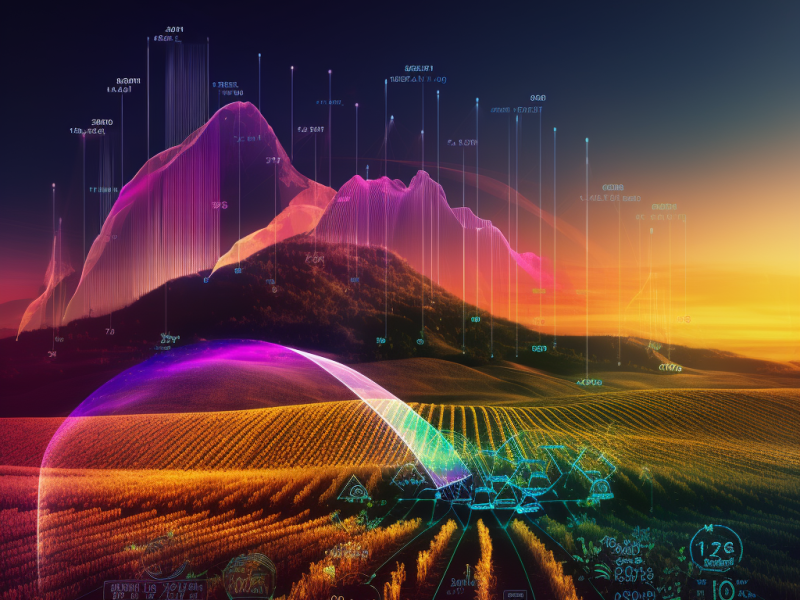At the heart of agricultural innovation, data analytics emerges as a game-changer. As a digital renaissance unfurls across our fields, ‘Smart Agriculture’ is more than a buzzword—it’s a lifeline to a planet grappling with feeding an ever-growing population. This blog post unravels the synergy between data analytics and precision farming and its monumental role in securing our food supply.
Precision Farming – Harnessing Data for Growth
Precision farming is a transformative approach to agriculture that employs meticulous data analysis to optimize resource utilization and crop yields. Utilizing a suite of advanced technologies—including the Internet of Things (IoT), drones, and satellite imagery—this method enables farmers to monitor and respond to the intricate needs of their crops with unparalleled precision. By systematically analyzing data on soil conditions, weather patterns, and plant health, precision farming equips agriculturalists with the insights necessary to tailor their practices to the unique requirements of each plot of land. This granular level of control facilitates the strategic allocation of water, fertilizers, and pesticides, reducing waste and minimizing environmental impact. The integration of predictive analytics further enhances the benefits of precision farming, allowing for proactive management strategies that anticipate and mitigate risks, such as disease or pest outbreaks. The ultimate goal is to create a symbiotic relationship between modern technology and traditional farming techniques, resulting in increased efficiency, sustainability, and resilience in our food systems. As such, precision farming stands at the forefront of agricultural innovation, promising a future where data-driven decisions lead to healthier crops, more robust farms, and a better balance with nature.
Food Security – A Technology-Driven Solution
Food security, a critical concern in our rapidly changing world, is increasingly reliant on technological advancements to meet the needs of a burgeoning global population. Technological solutions like data analytics and precision agriculture are at the forefront of this battle, providing tools that enable more efficient and productive farming practices. These technologies offer the means to analyze complex agricultural data, leading to smarter decision-making that maximizes output while preserving resources. With the aid of predictive models, it is possible to forecast environmental changes and their potential impacts on food production, thereby enabling preemptive measures to safeguard crops and livestock. The integration of technology extends throughout the supply chain, improving logistics and distribution to ensure that food reaches those in need, minimizing spoilage and inefficiencies. By applying these innovations, we can address the dual challenges of food quantity and quality—ensuring that populations not only have enough to eat but also access to a diverse and nutritious diet. In this way, technology acts as a pivotal instrument in the pursuit of global food security, contributing to a future where hunger and malnutrition are issues of the past.
The Fusion of Tech and Tradition
The harmonious melding of technology and tradition in agriculture presents a compelling narrative of progress and respect for heritage. This fusion brings the accumulated wisdom of generations into concert with the precision and analytical power of modern technology. Tech advancements such as sensors, drones, and artificial intelligence become instruments that amplify traditional farming acumen, offering insights into soil health, plant growth, and resource allocation with an accuracy that was previously unattainable. As this integration unfolds, traditional practices are not replaced but rather revitalized. They evolve to incorporate data-driven techniques that can lead to higher yields, better quality produce, and more environmentally friendly farming methods. The result is a revitalized agricultural landscape where the respect for time-honored techniques is matched by an eagerness to adopt innovative solutions. In this way, the fusion of tech and tradition is not just about improving outputs; it’s about securing a sustainable future for agriculture that honors the past while boldly stepping into the future.
Empowering Stakeholders – Benefits All Around
The paradigm of Empowering Stakeholders in agriculture through smart farming techniques creates a ripple effect of benefits that extend far beyond the individual farm. By integrating data analytics and precision farming tools, stakeholders across the agricultural spectrum, from farmers to consumers to policymakers, experience tangible advantages. Farmers, equipped with data-driven insights, can optimize their operations, reducing input costs and increasing yields, which translates to higher profitability and the potential for reinvestment into their communities. Consumers reap the rewards of this efficiency in the form of fresher, higher-quality produce, often with a reduced environmental footprint. Furthermore, the data collected serves as a valuable resource for policymakers, who can craft more effective agricultural policies and initiatives based on robust, ground-level intelligence. This democratization of data empowers all players in the food supply chain, fostering a more transparent, equitable, and sustainable agricultural ecosystem.
The convergence of data analytics with agricultural practices signifies a transformative leap in our capacity to meet the demands of a burgeoning global population. This conclusion is not merely an endpoint but a clarion call to recognize and embrace the potential that precision farming holds for the future of food security. By meticulously integrating technology into the very fabric of agricultural operations, we are setting a new standard for efficiency, sustainability, and productivity. The evidence is clear: data-driven agriculture has the power to not only improve yields and resource management but also to fortify our resilience against the challenges of climate change and resource scarcity. As we stand on this precipice of change, it is incumbent upon us to advance with determination, ensuring that the innovations we adopt today will nourish the generations of tomorrow. It is more than innovation—it is a commitment to a future where food security is a given, not a goal.
We are eager to hear from you and to provide the support you need to make a meaningful impact on the future of farming with data analytics. Together, we can cultivate a more efficient, sustainable, and food-secure world. Contact us today.

